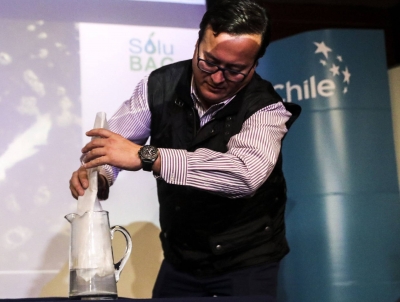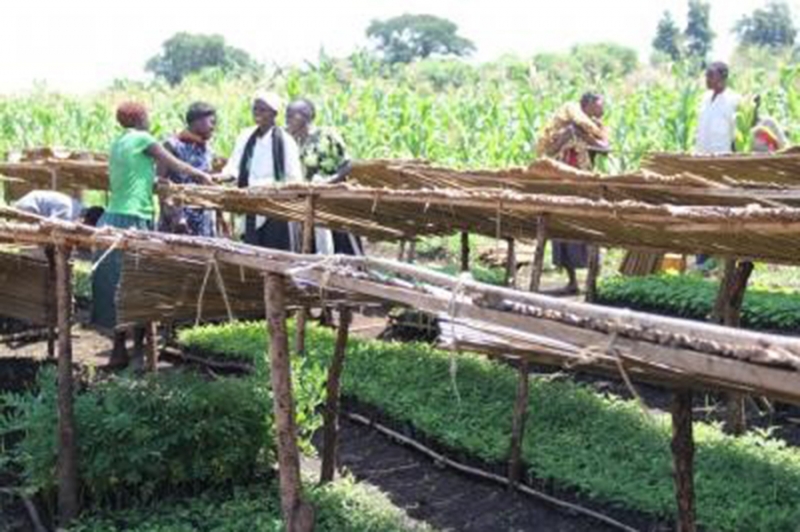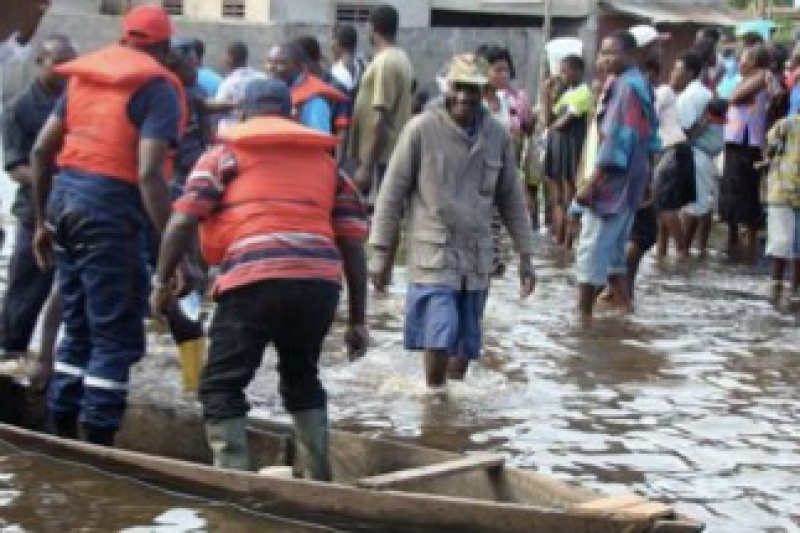 SSDA Solutions
South-South Development Academy
SSDA Solutions
South-South Development Academy
Mapping South-South Development Academy Solutions
Problem: Annually, 5 trillion plastic bags are used worldwide and 7 million plastic bags are consumed every minute.70% of them end up in the environment. The one-piece polyethylene shopping bag takes up to 500 years to decompose.
Solution: Solubag is a biodegradable material for the creation of non-polluting that completely dissolve in water in 5 minutes without contamination.
Goals and Objectives: The solution aims to eliminate single-use plastic bags.
Implementation: Roberto Astete and Cristian Olivares, founders of Chilean start-up Solubag developed the solution in 2014.
Solubags uses limestone instead of oil by-products. It has zero environmental impact compared to other alternatives like oxo-biodegradable bags, which are still made of polyethylene and break into small pieces of toxic plastic.
The chemical formula of Solubags contains polyvinyl alcohol (PVA), a material found by Astete and Olivares while analysing biodegradable detergent capsules.
Solubag’s raw material can be extruded in any plastic extrusion machine, which allows it to be scaled very fast.
Achievements: The solution is recognized as the best innovation in Latin America, a prize awarded at the Summit Conference held in March 2018 in Chile.
The innovation is expected to be widely accepted in Chile, where a ban on plastic bags in large businesses came into force in February 2019. Solubag currently produces in China and is considering installing a factory in Tomé, Chile.
Contact information:
Chile
Phone: +56232486126
Email: This email address is being protected from spambots. You need JavaScript enabled to view it.
Additional Info
- Location(s) Chile
- Type(s) Solution
- Theme(s) Climate Change, Sustainable Development, Waste reduction, Water and Sanitation
- SDG(s) 6. Clean Water and Sanitation, 9. Industry, Innovation and Infrastructure, 11. Sustainable cities and communities, 12. Responsible Consumption and Production
- Website solubag.cl
- Latitude -23.793978
- Longitude -69.524086
- Types of ComSec Solutions Solution
Global Ecosystems Based Adaptation in Mountains Programme
Wednesday, 26 October 2016 14:50These countries have been selected as pilot countries, due to their significant vulnerability to climate change, coupled with their endowment of fragile mountain ecosystems upon which a multitude of communities and economic activities depend.
The Ecosystems-based Adaptation (EbA) in Mountains Programme is a global partnership jointly implemented by UNDP, UNEP and IUCN from 2011-2015, with funding from the Germany’s Federal Ministry for the Environment, Nature Conservation, Building and Nuclear Safety (BMUB). While global in scope, Uganda, Nepal and Peru were selected as pilot countries, due to their significant vulnerability to climate change, coupled with their endowment of fragile mountain ecosystems upon which a multitude of communities and economic activities depend.
The overarching Programme goal is to strengthen capacities of the involved governments and local communities to reduce vulnerability and increase resilience to the effects of climate change using EbA measures in targeted mountain ecosystems.
Expected programme results include:
- New and field tested methodologies and decision-making tools for EbA, including Vulnerability & Impact Assessments;
- Monitoring and Evaluation centered on ecosystem resilience; and
- Capacities and knowledge of all involved stakeholders (national, district and local level government, local communities and civil society organizations) will be enhanced for planning and implementing both early action “No Regrets” and longer-term EbA measures through pilot activities in target mountain ecosystems.
Based on evidence emerging from these processes, lessons will also be generated on how to use cost-benefit analyses to make an economic case for specific EbA measures. In close collaboration with key government agencies, evidence and lessons will be generated on how to mainstream EbA into broader district and national policy and financing frameworks. These lessons can be scaled-up and shared as policy examples at regional and global levels beyond the three pilot countries. Overall, the resilience to climate change of targeted mountain ecosystems and their local custodians will be enhanced.
More information on the project is available here: http://adaptation-undp.org/projects/mountain-eba
Achievements:
- Methodologies and tools for EbA decision making developed
- EbA methodologies and tools applied at ecosystem level
- EbA pilot projects implemented in each pilot country and contributing towards ecosystem resilience and reduction of livelihood vulnerability in the face of climate change impacts
- Business case for EbA at the local and national levels developed
- New learning and knowledge on EbA generated
Replication:
- Learning materials were generated from the project to share best practices and knowledge:
- Introduction to Ecosystem-based Adaptation: A nature-based response to climate change
- Generating multiple benefits from Ecosystem-based Adaptation in Mountain Ecosystems
- Making the economic case for Ecosystem-based Adaptation
- Making the case for policy change and financing for Ecosystem-based Adaptation
Budget: The project was funded by Germany’s Federal Ministry for the Environment, Nature Conservation, Building and Nuclear Safety (BMUB): Euro 11.5 million
Contact details:
Caroline Petersen, This email address is being protected from spambots. You need JavaScript enabled to view it.
Tine Rossing, This email address is being protected from spambots. You need JavaScript enabled to view it.
Additional Info
- Location(s) Nepal, Peru, Uganda
- Type(s) Solution
- Theme(s) Climate Change, Natural Resources
- SDG(s) 13. Climate Action
- Latitude 0.596979
- Longitude 32.539691
- Locations in Africa Uganda
- Types in Africa Solution
- Themes in Africa Climate Change, Natural Resources Management
- SDGs in Africa 13. Climate Action
Strengthening the conservation role of Togo’s national System of Protected Areas (PA)
Wednesday, 26 October 2016 13:41The proposed long-term solution for biodiversity conservation in Togo is to strengthen the management of the system of protected areas (PA) through effective approaches to rehabilitation and management of PA. The Project is funded by West African Economic and Monetary Union (WAEMU) and the Global Environment Facility (GEF). UNDP will help Togo develop prerequisites to be able to join in the coming years the initiative for the conservation of biodiversity led by Burkina Faso, Benin and Niger in partnership EU, WAEMU and UNDP.
Goal: Protect the globally significant biodiversity in Togo’s Savanna Biomes and ensure PA connectivity at the eco-regional level.
Objective: Strengthen Togo’s protected area system management to improve its contribution to the conservation of biodiversity by applying effective approaches to PA rehabilitation and management.
More information:
PA estate covering approximately 578,000 hectares, covering a large region in Togo
Running for five years, from 2012- 2017
PA operationalization of the OKM complex in Togo, with implementation at the site level of rehabilitation measures, participatory management arrangements and rehabilitation of connectivity at Eco-regional level.
Use of key monitoring tools, typical of GEF Biodiversity projects, these include the Management Effectiveness Tracking Tool, or METT (Annex 2), which also includes UNDP’s PA System Financial Sustainability Scorecard.
Achievements:
- Strengthened biodiversity conservation and PA management effectiveness of a rationalized PA system
- Direct threats to the OKM complex biodiversity mitigated
- Other outcomes yet to be published as project was just completed this year
Budget: USD 2,222,200
An amount USD 70,000 was reserved in the budget (from WAEMU funds) for the inclusion of the OKM Complex into the assessments of IUCN’s MIKE programme with respect to ecological management. The frequency is every 5 years.
Contact details:
UNDP
Headquarters
UNDP Building,
109 Boulevard Félix Houphouët
Boigny P.O. Box 4596 Gamal Abdul Nasser Avenue,
Lomé, Republic of Togo.
Phone: +228 984 97933
Email: This email address is being protected from spambots. You need JavaScript enabled to view it.
Global Environment Facility (GEF)
Operational Focal Point
Mr. Djiwonou Folly
Ministère de l`Environnement et des Ressources BP 355
Lomé, Togo
Tel: + 228 904 3608
Email: This email address is being protected from spambots. You need JavaScript enabled to view it.
Additional Info
- Location(s) Benin, Burkina Faso, Niger, Togo
- Type(s) Solution
- Theme(s) Climate Change, Disaster Risk Management
- SDG(s) 13. Climate Action
- Latitude 12.029933
- Longitude 2.309617
- Locations in Africa Benin, Burkina Faso, Niger, Togo
- Types in Africa Solution
- Themes in Africa Climate Change, Disaster Risk Management
- SDGs in Africa 13. Climate Action








